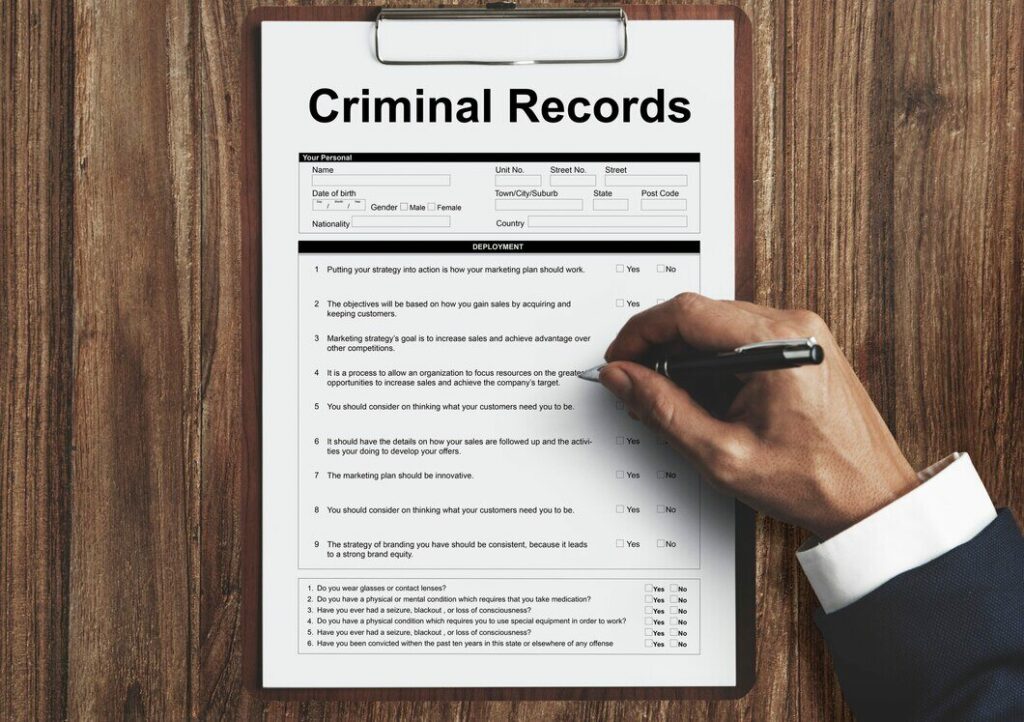How to Clean Your Criminal Record
Ever feel like your past is holding you back? A criminal record can be a heavy weight, impacting everything from job prospects to housing applications. But what if you could lighten that load? This article explores how to clean your criminal record, providing a comprehensive guide to understanding the process and navigating the complexities of expungement, sealing, and setting aside convictions. We’ll delve into the details of what constitutes a criminal record, the different types of records, and the steps you can take to move forward with a cleaner slate. So, ready to take control of your future? Let’s dive in.
Understanding Your Criminal Record
What exactly *is* a criminal record, anyway? Think of it like a permanent report card, but instead of grades, it lists your interactions with the criminal justice system. This detailed history can include arrests, charges, convictions, and even dismissals. It’s a comprehensive document that paints a picture of your legal past, and unfortunately, that picture can sometimes be misleading or unfairly impact your present. Isn’t it frustrating that even minor offenses can linger for years, affecting your chances of getting a job, renting an apartment, or even securing a loan? Understanding what’s in your record is the first step toward cleaning it up.
Now, let’s break down the types of information typically found within a criminal record. First, you’ll likely find identifying information such as your name, date of birth, and any aliases you might have used. This helps authorities distinguish between individuals with similar names. Think of it as the label on your report card. Next, the record will detail the specifics of any arrests, including dates, locations, and the arresting agency. It’s like a timeline of events, outlining when and where each interaction with law enforcement occurred. Imagine applying for a job and having a potential employer see a minor arrest from years ago – it could unfairly influence their decision, couldn’t it?
Beyond arrests, your criminal record will also include information about the charges filed against you, the disposition of those charges (whether you were convicted, acquitted, or the charges were dismissed), and the sentences imposed if you were convicted. This section is the meat of the report card, showing the outcome of each interaction with the justice system. It can include everything from minor infractions like traffic violations to more serious offenses. This comprehensive history can be a real hurdle, even if you’ve turned your life around. But don’t despair! There are options available to help you move forward.
Furthermore, your record may include information about any time served in jail or prison, probation or parole periods, and any fines or restitution ordered by the court. This paints a complete picture of the consequences you faced for any convictions. Think of these details as the teacher’s comments on your report card – sometimes harsh, sometimes encouraging, but always part of the overall story. This information can be especially damaging when seeking employment or housing, as it can create a negative impression even if you’ve completed your sentence and are working to rebuild your life.
Finally, it’s crucial to understand the difference between arrest records and conviction records. An arrest record simply documents that you were taken into custody by law enforcement. It doesn’t necessarily mean you were guilty of anything. Imagine being arrested but later having the charges dropped – that arrest record would still exist, wouldn’t it? A conviction record, on the other hand, signifies that you were found guilty of a crime, either through a plea agreement or a trial. This distinction is important because the options for cleaning your record often depend on whether the charges resulted in a conviction. It’s like the difference between a failing grade and a grade that’s been removed from your transcript. One carries significant weight, while the other doesn’t.
How to Clean Your Criminal Record
Ever feel like a past mistake is holding you back? Like a shadow clinging to your heels, a criminal record can impact nearly every facet of your life, from landing that dream job to securing a safe place to live. But what if you could erase the slate, or at least minimize the stain? This article dives into the practical steps you can take to clean your criminal record, offering a beacon of hope for a brighter future. We’ll explore the “how-to’s” and delve deep into the “why’s,” examining the incredible benefits that come with a clean record. So, ready to unlock new opportunities and reclaim your life?
Benefits of a Clean Record
Imagine applying for a job you’re perfectly qualified for, only to be turned away because of a past mistake. Frustrating, right? A clean criminal record opens doors you might not even realize are closed. It’s not just about job prospects, though those are significantly improved. Think about renting an apartment or even securing a loan. Landlords and lenders often conduct background checks, and a criminal record can be a major roadblock. With a clean record, these everyday transactions become smoother, less stressful, and ultimately, more successful. It’s like having a key that unlocks a multitude of possibilities, paving the way for a more stable and secure future. Who wouldn’t want that peace of mind?
Beyond the practical advantages, a clean record offers something even more profound: a renewed sense of self-worth. It allows you to move forward without the constant weight of past transgressions, fostering a sense of dignity and self-respect. This internal shift can be incredibly empowering, leading to increased confidence and a more positive outlook on life. It’s like shedding an old, heavy coat, allowing you to move freely and embrace new opportunities with open arms. It’s a chance to redefine who you are, not by your past, but by your potential.
Moreover, a clean record can positively impact your relationships with family and friends. It can mend broken trust and rebuild bridges that may have been damaged by past actions. Having a clean record demonstrates a commitment to positive change, reassuring loved ones that you’re on the right path. This renewed trust can strengthen bonds, creating a more supportive and loving environment. It’s like the fresh start after a storm, allowing relationships to blossom anew, stronger and more resilient than before.
Furthermore, a clean criminal record can significantly impact your involvement in your community. Volunteering, participating in local events, and even coaching youth sports often require background checks. A clean record allows you to fully engage in these activities, contributing your time and talents to causes you care about. It’s a chance to give back, make a difference, and become an active, contributing member of society. Think of it as a ticket to participate, allowing you to connect with your community on a deeper level and foster a sense of belonging.
Finally, having a clean record provides a sense of closure and allows you to truly put the past behind you. It symbolizes a fresh start, a clean slate, and the opportunity to build a brighter future. It’s a tangible representation of your rehabilitation and commitment to a better life, offering a powerful message of hope and redemption. This sense of closure can be incredibly liberating, freeing you from the shackles of the past and empowering you to embrace the possibilities that lie ahead. Isn’t that a future worth striving for?
How to Clean Your Criminal Record: A State-by-State Guide
Ever wondered how to wipe the slate clean and move forward with a fresh start? We’re talking about cleaning your criminal record, a process that can feel like navigating a legal labyrinth. This guide will break down the often-confusing process, offering a clear roadmap for navigating the complexities of expungement, sealing, and setting aside convictions. From understanding state-specific laws to preparing the necessary paperwork, we’ll cover everything you need to know to begin your journey toward a cleaner record.
State-Specific Laws and Regulations
Navigating the world of record cleaning can feel like trying to solve a Rubik’s cube blindfolded. Why? Because the laws governing this process vary dramatically from state to state. What might be a straightforward expungement in one state could be a Herculean task in another. This section dives into the nuances of these state-specific regulations, highlighting the key differences you need to be aware of. Understanding these variations is the first crucial step toward successfully cleaning your record.
Some states, for instance, offer automatic expungement for certain minor offenses after a specific period, essentially hitting the “reset” button on your record. Imagine it like a computer’s recycle bin automatically emptying after a certain amount of time. Other states, however, require a formal petition to the court, often involving a hearing and legal representation. This is more akin to submitting a formal request for file deletion, requiring approval from a system administrator. The differences can be stark, so understanding your state’s specific laws is paramount.
Certain convictions, such as violent felonies or sex crimes, may be entirely ineligible for expungement or sealing in many jurisdictions. These are often seen as permanent marks on a record, much like indelible ink. Even within a single state, the eligibility criteria can vary depending on the specific nature of the offense, the time elapsed since the conviction, and even the individual’s subsequent behavior. Think of it like a credit score – different factors contribute to the overall assessment, and even small changes can impact the outcome.
Waiting periods, a crucial component of record cleaning laws, also fluctuate widely. Some states impose relatively short waiting periods, perhaps a few years, after the completion of a sentence. Others require significantly longer periods, sometimes a decade or more, before an individual can even apply for expungement. This waiting period is akin to a probationary period, demonstrating a commitment to rehabilitation and a clean record.
Beyond the waiting period, the application process itself can differ substantially. Some states have streamlined online portals for submitting applications, making the process relatively user-friendly. Others require paper filings and navigating complex court procedures. It’s like the difference between ordering groceries online and having to hand-write a shopping list and navigate a crowded supermarket.
The cost associated with record cleaning also varies. While some states offer fee waivers for low-income individuals, others impose substantial filing fees and legal costs. This financial hurdle can unfortunately create a barrier for some individuals seeking a fresh start. It’s like having a toll booth on the road to a second chance, which can unfortunately prevent some from even starting the journey.
Finally, the consequences of a successful expungement or sealing differ. In some states, a sealed record is essentially invisible to most employers and background checks, offering a genuine clean slate. In other states, a sealed record may still be accessible to certain entities, such as law enforcement or licensing boards. This distinction is crucial to understand, as it directly impacts the practical benefits of cleaning your record. So, do your homework and understand your state’s specific regulations. It’s the first, and perhaps most important, step in this journey.
“`html
How to Clean Your Criminal Record
A criminal record can feel like a shadow, following you through life and hindering opportunities. But what if you could lighten that shadow, or even erase it completely? We’ll explore how to clean your criminal record, navigating the often confusing world of expungement, sealing, and certificates of rehabilitation. We’ll also tackle common misconceptions and break down the process step by step, giving you the knowledge you need to move forward. So, if you’re ready to learn how to clear your past and embrace a brighter future, let’s get started.
Common Misconceptions about Record Cleaning
The path to a clean record can be shrouded in myths and misunderstandings. Many people believe that once something’s on their record, it’s there forever—like an indelible stain. But is that really true? Let’s debunk some common misconceptions that might be holding you back from pursuing a cleaner slate.
First, it’s important to understand that “cleaning your record” is a bit of a catch-all phrase. It can encompass several different legal processes, including expungement, sealing, and setting aside a conviction. Each process has its own specific requirements and outcomes. Thinking they’re all the same is like assuming all citrus fruits are lemons—you’re missing out on the nuances of oranges and grapefruits!
Another common misconception is that everyone qualifies for expungement or sealing. Unfortunately, this isn’t the case. Eligibility varies depending on the nature and severity of the offense, the jurisdiction where the conviction occurred, and how much time has passed since the completion of the sentence. It’s not a one-size-fits-all system, and assuming you qualify without checking the specific laws in your area is like trying to fit a square peg into a round hole – it just won’t work.
Some believe that once a record is expunged or sealed, it vanishes completely, as if it never existed. While these processes significantly restrict access to your criminal history, certain entities might still be able to see it, such as law enforcement agencies or professional licensing boards. Think of it like a confidential file – it’s not gone, but it’s highly protected and not readily available to the public.
There’s also the myth that cleaning your record is a quick and easy process. In reality, it can be time-consuming and require navigating complex legal procedures. It often involves filing petitions, gathering supporting documents, and potentially attending court hearings. Imagine it like untangling a knotted ball of yarn—it takes patience and persistence.
Many assume that hiring a lawyer is unnecessary for cleaning their record. While it’s true that you *can* represent yourself, navigating the legal system alone can be challenging. A lawyer specializing in expungement and record sealing can guide you through the process, ensuring you meet all requirements and increasing your chances of a successful outcome. They’re like experienced Sherpas guiding you through the complexities of the legal mountain range.
Another misconception revolves around the cost: some people think it’s prohibitively expensive. While there are fees involved, including court filing fees and potentially lawyer fees, some jurisdictions offer fee waivers for those who can’t afford them. Don’t let the perceived cost deter you from exploring your options—it’s like assuming a vacation is out of reach without checking flight and hotel deals first.
Finally, some believe that cleaning their record guarantees a clean slate in every aspect of their life. While it can open doors to employment, housing, and other opportunities, it doesn’t erase the past completely. For example, some employers might still ask about past convictions during interviews, even if they’re sealed or expunged. Think of it as healing a wound—the scar may still be visible, but the injury is gone and you’ve moved on.
“`


